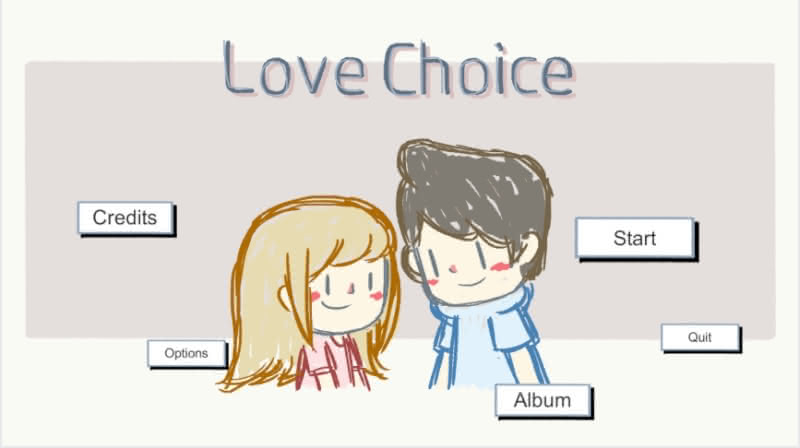
For today’s post, I will review a short interactive visual novel called LoveChoice. LoveChoice features three separate love stories wherein the player’s choices determine the ending for the featured couple. LoveChoice is available in the United States exclusively through Steam for both PC and Mac. If you decide to buy the game for yourself after reading my LoveChoice review, you can see LoveChoice on Steam (this is not an affiliate article, I have no stake in whether you buy LoveChoice).
With our brief introduction out of the way, I will proceed to my LoveChoice review. Because one purpose of this review is to introduce LoveChoice to readers who might decide that they are interested in playing the game for themselves, I will refrain from including any information that would meaningfully spoil the plot. In the review, I will offer my spoiler-free impressions of the game and its aesthetic merits and flaws, and you may do with that information as you will.
Readers who are interested in cheap indie visual novels on Steam may also be interested in my Halloween review of the relatively obscure Bad End. It seems like holiday visual novel reviews are becoming something of a tradition here.
(I took all of the screen-captures in this article.)
LoveChoice Details

Game: LoveChoice
Developer & Publisher: Akaba Studio
Release: Sep. 30, 2018 (U.S., CH, JP)
Genre: Interactive Visual Novel
Platform: PC/Mac (Steam)
Reviewed on: PC running Manjaro Linux
Photo Credit: Steam ($1.99 USD)
An team at Akaba Studio developed and published LoveChoice. LoveChoice was released worldwide on Steam on September 30, 2018. The game remains in Steam’s “Early Access” program, but Akaba Studio states that LoveChoice is complete, and its remaining in Early Access is due to unrelated issues. Akaba Studio is based in Guangdong, China.
LoveChoice is priced at $1.99. Like almost all Steam games, it occasionally goes on sale for less. Akaba Studio also offers the LoveChoice original soundtrack in three parts, with each part priced at $1.99. The three soundtracks contain all 17 soundtracks used in LoveChoice. I did not purchase the soundtrack DLC separately, so all references to the soundtrack in this review will refer to the game itself. I will note that the game does not include a menu through which a player can easily play any of the songs.
Platform Availability – Windows, Mac, and Linux
LoveChoice is officially available for both Windows and Mac. Its system requirements, listed on the LoveChoice page in the Steam store, are minimal.
As I have mentioned before, I run Manjaro Linux on my desktop instead of Windows. Although the store page for LoveChoice does not state that it is Linux-compatible, I was able to run it perfectly without meddling with any settings. My experience is in line with reports on ProtonDB, a website where Linux users post compatibility reports for running Windows games on Linux.
What Kind of Game is LoveChoice?
LoveChoice is an interactive visual novel. The entire game consists of reading dialogue and making choices. In some scenes where the player is prompted to choose a dialogue option, he or she may also use the cursor to interact with people or objects on the screen.
LoveChoice features three stories that are independent of each other, although they must be cleared in a certain order. The player’s choices determine how each story ends. Each story effectively has two-to-three endings.
A Spoiler-Free Outline of the Stories in LoveChoice
LoveChoice is broken into three separate stories, each examining a different type of relationship.
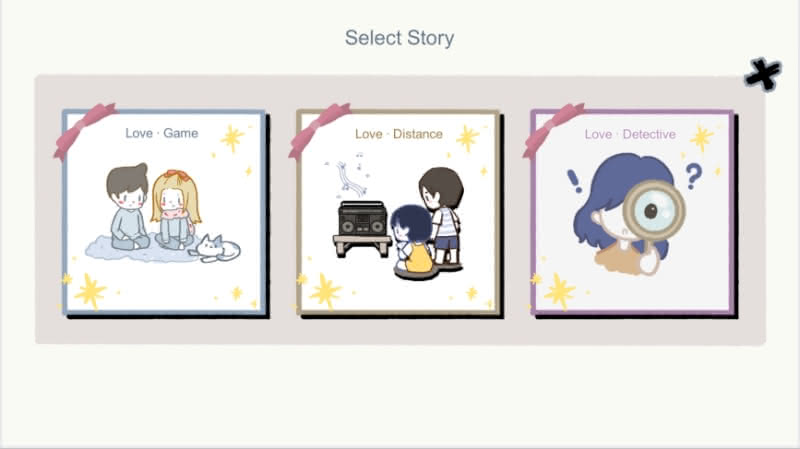
The first story is Love · Game. In Love · Game, two unnamed characters meet at a game design event. These two characters decide to go on a date. The player controls the young man in the relationship, and the player’s choices at key points determine how the relationship goes. Whether the lovely couple stays together or breaks up depends in large part on the player’s choices throughout the brief story.
After completing at least two endings in Love · Game, the player can take on the second story, Love · Distance. In Love · Distance, the player takes the role of Stan when Stan is a young boy. Stan meets and befriends his next-door neighbor, Grace. After growing up together, Grace eventually moves elsewhere. The rest of the story involves Stan and Grace navigating their long-distance relationship. The player’s choices on behalf of Stan determine the outcome of their relationship.
After completing both Love · Game and Love · Distance, the player can finish the game by playing through Love · Detective. Love · Detective features a young housewife who becomes suspicious that her husband may be engaging in extracurricular activities due to his returning home from work late and receiving a phone call from a woman she does not know. The player takes the role of the wife as she undertakes an investigation to get to the bottom of the matter. Certain choices by the player on behalf of the wife determine how the story ends. This final story has something of a “true end,” so to speak.
LoveChoice Mechanics
Although LoveChoice does not have a very complex structure – each story has a limited range of possible outcomes – it does present some interesting mechanics.
Interacting with the Scene Instead of Choosing Dialogue Options
Most of the player’s time in LoveChoice will be spent reading dialogue. On numerous occasions in the first two stories, the player will be presented with opportunities to make a choice. In a visual novel such as Bad End – the extent of the player’s ability to interact with the story is limited to choosing between a set of dialogue options. At certain points, LoveChoice goes a bit further – not only can the player choose between two-to-four dialogue options, the player is also able to interact with other things on screen.
Because I do not want to give away how to progress through the game, I will give a generic example of how LoveChoice’s choices work on occasion. Let us say we have a scene with character A and character B. The player controls character A. During the scene, the game presents the player with a choice between two dialogue options. The player can choose one of these two dialogue options. However, if the player moves the cursor around the screen, he or she may find that it is possible to interact with A or B or an object depicted in the background. In so doing, the player may cause a different outcome than choosing one of the dialogue options. Furthermore, in some cases, it may be possible to refrain from choosing any option at all.
On the Steam page, Akaba Studio recommends playing LoveChoice with a mouse that has a scroll wheel. There are a few points where using the scroll wheel has an effect on the scene.
Mini Games
All three stories in LoveChoice feature at least one mini game. The first two mini games require the player to click on certain things at the right time. The first, which arrives early in Love · Game, has the player trying to click on good menu options that are falling down the screen, while avoiding bad ones.
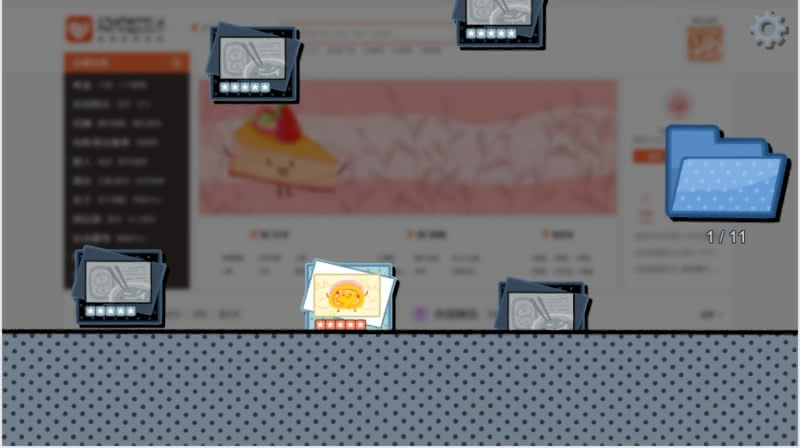
Mechanics in Final Story – Love · Detective
Love · Detective features point-and-click gameplay. Instead of focusing on making dialogue choices, Love · Detective requires the player to interact with the environment to gather clues and solve very basic puzzles. Those who are familiar with the Zero Escape and Danganronpa series can think of Love · Detective as a very simple spin on the concept of those series in terms of its mechanics.
English-Language Translation Quality in LoveChoice
The developers of LoveChoice translated the game from Chinese to English themselves. On the Steam page, the developer responsible for the translation stated that while he knows Chinese, Japanese, and English, he cannot do better than a native speaker.
To begin, when I say that I am reviewing translation quality, I am referring to how the script reads in English. Because I cannot read LoveChoice in its original language, I have no view on how faithful the translation is.
The English translation quality is serviceable. That is, there was never a point while playing that I found any of the dialogue confusing or ambiguous. The translation presents no playability issues. This is a very significant point in LoveChoice’s favor in light of the fact that determining the “correct” choice depends on understanding a scene’s emotional subtleties. Many of the translation issues fall into a gray zone, not technically wrong, but unnatural.
With that point in the translation’s favor aside, it does read like an amateur translation . The dialogue consistently reads a bit wooden and off. See several examples below:
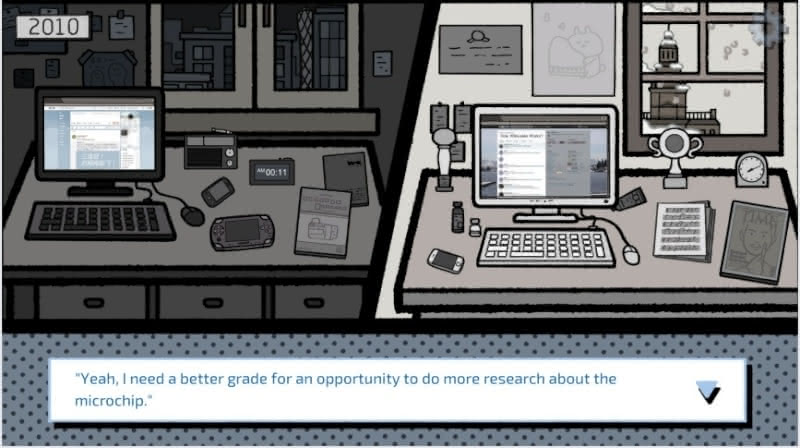

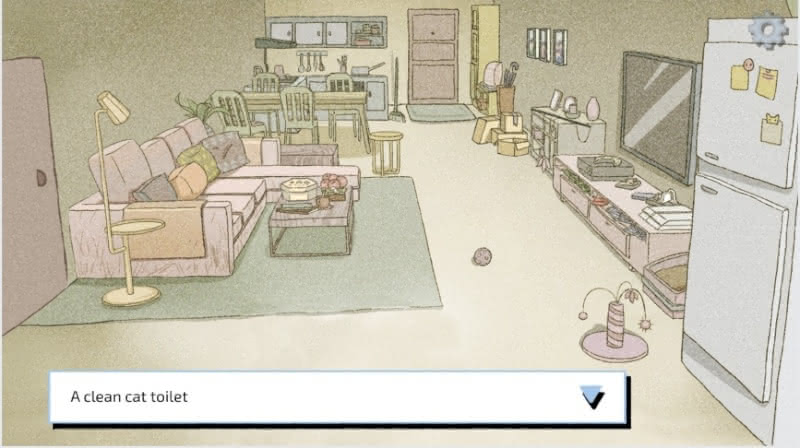
Outright typos are rare. There was only one that jumped out at me.
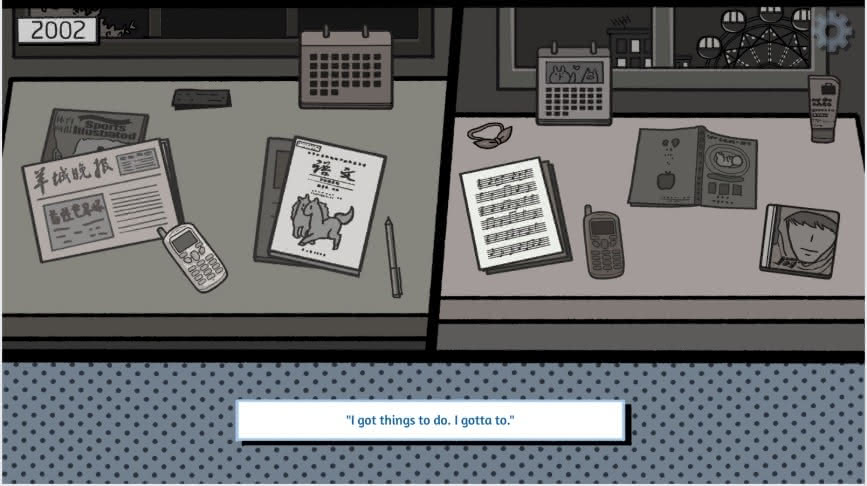
Translation Issues Are Not a Deal-Breaker
I do not think that the clunky translation is a deal-breaker for LoveChoice. The game gets subtle points across even when the characters speak in a way that does not sound natural in English. The issues are more tolerable in light of LoveChoice’s aesthetic qualities and very low price. With that being said, I hope that Akaba Studio can at some point obtain a cleaner and more professional English translation for LoveChoice, whether by hiring someone or finding a willing volunteer.
In a minor quibble, I found the decision to name the characters in the second story “Stan” and “Grace” to be a bit odd given the fact that they are obviously not Western.
Writing and Story Quality in LoveChoice
Having already noted my issues with LoveChoice’s English dialogue, I will consider its writing quality as a separate matter. By “writing quality” here, I am referring to its themes and how well the game expresses its sentiments and ideas.
On this count, LoveChoice is impressive.
The first story depicts a couple that has some communication issues, like couples often do. At many points, the player must decide how to handle a difficult moment in the romantic relationship. This may require choosing the right thing to say, choosing the right thing to do, or doing absolutely nothing at all. The choices ultimately make sense even though the game tells us very little about the two characters.
The second story takes more unexpected twists and turns than does the first story, but once again, the game’s sentiments make sense as do the choices that are necessary to advance the story. I will note that some players may find Love · Distance a bit harder to relate to than the first and third stories due to how the long-distance relationship proceeds. I think the story did struggle a bit at times with the lack of insight into Stan and Grace outside of their relationship. With that being said, I did not have too much difficulty with the nature of their relationship. My favorite move is 5 Centimeters Per Second, after all.
I figured out where the final story was going within the first minute, and I think that most readers who give the game a spin will as well. Nevertheless, why the characters behave and think as they do makes sense, whether they are right or wrong in doing so.
Art Quality
I will say without equivocation that LoveChoice is a gorgeous visual novel. The art style is simple, somewhat evoking a pop-up book. Everything looks as if it were drawn with pencil and marker. LoveChoice generally does not use many colors, but it does well in its simplicity. The character designs are all memorable and adorable. LoveChoice’s artistic style is one of its most endearing qualities. See below for some examples:
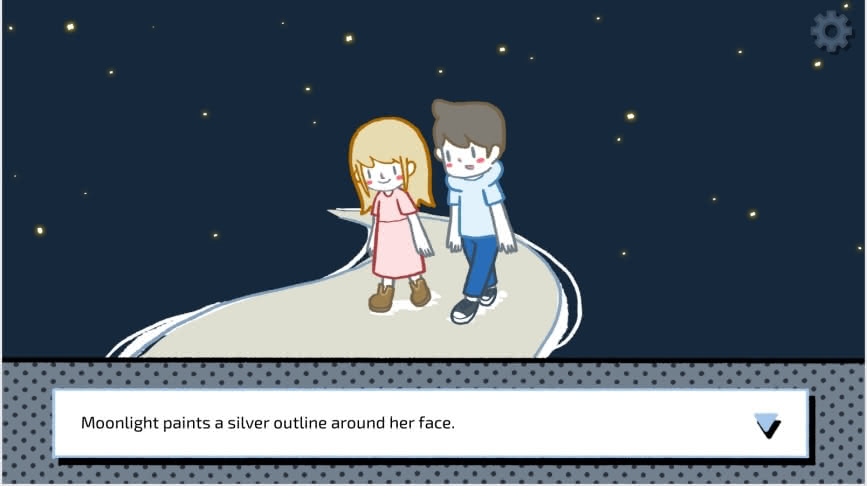


My only practical qualm with LoveChoice’s visual design is that it is sometimes not obvious what you can and cannot interact within a scene. This made the detective parts of the final story mildly frustrating at a couple of points, but it never rose to the point of being a hardship.
Soundtrack
While I do not plan to spend $6 on the LoveChoice’s soundtrack on Steam, the piano-inspired backdrop is very well done. Unsurprisingly, some of the musical high points come in the second story, Love · Distance, which features an aspiring pianist in Grace. LoveChoice also does a good job of mixing up its song selection in different scenes such that it never becomes repetitive.
Length
Akaba Studio suggests that LoveChoice has about 1.5 to 2 hours of content. I spent a bit longer on it, taking time to gather screenshots, note important scenes, and occasionally leave the game running while I did something else. For players who sit down and play LoveChoice straight through, somewhere in the 1.5-to-3 hour-range, depending on how readily the player figures out how to interact with scenes, sounds about right to me. Moreover, figuring out how to claim all 20 Steam achievements for LoveChoice may extend gameplay a bit beyond the minimum 1.5 to 2 hours. Several of the Steam achievements involve interacting with certain things in scenes that do not necessarily affect the outcome of the story.
Overall LoveChoice Review and Recommendation
I enjoyed my time with LoveChoice. It is a cute visual novel with charm and character, and it leaves an impression despite its short length. It is not without its flaws. The localization is clunky and there are times when figuring out all of one’s options is not as intuitive as I would like. With those flaws aside, LoveChoice is an easy game for me to recommend both to people who play visual novels and those who have never played one at all. Although I played LoveChoice solo, I could see it being fun to play with a friend or partner one afternoon or evening.
LoveChoice is very short, but its $2 price-tag is fair in light of its length. Its low price also makes some of the localization issues more acceptable than they would be for a more expensive game. For those who enjoy the game, a few of the Steam achievements slightly extend the amount of time one may spend with the game.
It does not come with many extras – only a scene gallery. It is possible to start in the middle of the second and third stories after clearing them, but the game always forces players to start from the beginning of the first story due to how its choice structure works.
Although I cannot say much about it here, LoveChoice has a very clever ending after the player completes the best path for the final story. In addition to being smart, the developers express their full gratitude to people for buying their game and playing until the end. For LoveChoice, I unequivocally recommend watching the end credits.
Thank you Akaba Studio for the short-but-charming adventure.